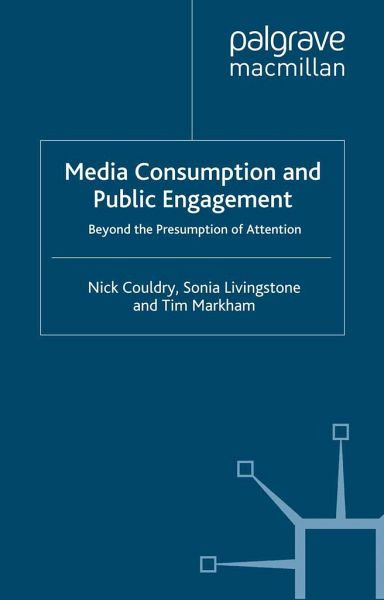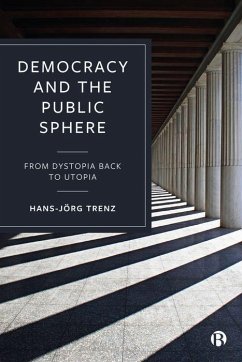
Media Consumption and Public Engagement
Beyond the Presumption of Attention
Versandkostenfrei!
Versandfertig in 6-10 Tagen

PAYBACK Punkte
38 °P sammeln!





Democracy is based on the belief that the media gets the attention of voters. But is this plausible in an age of multiplying media, disillusionment with the political system and time-scarcity? This book, now available in paperback, addresses this question, and charts experiences of 'public connection'.
Author S. Livingstone: Nick Couldry is a sociologist of media and culture. He is Professor of Media, Communications and Social Theory at the London School of Economics and was previously Professor of Media and Communications at Goldsmiths, University of London. He is the author or editor of eleven books including for Palgrave Ethics of Media (co-edited with Mirca Madianou and Amit Pinchevski, 2013) and Media Consumption and Public Engagement: Beyond the Presumption of Attention (with Sonia Livingstone and Tim Markham, 2007,revised paperback edition 2010). He has led funded research on citizens public connection (see http://publicconnection.org.uk/) and on story exchange in community engagement (http://www.firm-innovation.net/portfolio-of-projects/storycircle/). He is currently with Andreas Hepp working on a new book on the mediated construction of reality.
Produktdetails
- Consumption and Public Life
- Verlag: Palgrave Macmillan / Palgrave Macmillan UK / Springer Palgrave Macmillan
- Artikelnr. des Verlages: 978-0-230-24738-3
- Revised, Updated edition
- Seitenzahl: 247
- Erscheinungstermin: 3. April 2007
- Englisch
- Abmessung: 214mm x 138mm x 20mm
- Gewicht: 329g
- ISBN-13: 9780230247383
- ISBN-10: 0230247385
- Artikelnr.: 27005699
Herstellerkennzeichnung
Libri GmbH
Europaallee 1
36244 Bad Hersfeld
gpsr@libri.de
'A significant contribution to academic research.' - The Political Quarterly
'...makes an important contribution to debates around the relationship between celebrity and politics, democratic malaise and media effects, which should be of interest to, and should be read by, students both of politics and of media and society more generally.' - European Journal of Communication
'...an important book, contributing valuable empirical evidence on 'actually existing' public spheres and presenting us with some disturbing and thought and hopefully, action - provoking findings.' - Journal of Consumer Culture
'This book is... a text I will certainly be recommending to students engaged in postgraduate study of audiences, or
'...makes an important contribution to debates around the relationship between celebrity and politics, democratic malaise and media effects, which should be of interest to, and should be read by, students both of politics and of media and society more generally.' - European Journal of Communication
'...an important book, contributing valuable empirical evidence on 'actually existing' public spheres and presenting us with some disturbing and thought and hopefully, action - provoking findings.' - Journal of Consumer Culture
'This book is... a text I will certainly be recommending to students engaged in postgraduate study of audiences, or
Mehr anzeigen
with any interest in the relationship between media and political engagement.' - Participations
'It is almost as if I had been waiting for precisely this book...with inspiring conceptual clarity, detailed empirical study, and a very accessible style, the authors explore the complex character of citizens' media connection in modern democracies.' - Professor Peter Dahlgren, Lund University, Sweden
'This book may well prove to be an important one for those interested in the relationship between media and politics...This book is a demanding one to read, but it is a text I will certainly be recommending to students engaged in postgraduate study of audiences, or with any interest in the relationship between media and political engagement.' - Michael Higgins, Journal of Audience and Reception Studies
'Couldry et al have provided some significant and rigorous empirical research on public engagement with, and consumption of, the media. Their research makes an important contribution to debates around the relationship between celebrity and politics, democratic malaise and media effects, which should be of interest to, and should be read by students both of politics and of media and society more generally.' Heather Savigny, European Journal of Communication
'Nick Couldry, Sonia Livingstone, and Tim Markham apply a timely empirical lens to issues that have been taken-for-granted for too long. It has been too easy to assume a normative role for media in civic knowledge and participation in the face of evidence of decline and then to blame media for that decline. They show that the situation is much more subtle, nuanced, and complex than that; that while the media are central, media cannot alone address the broader conditions that strain a sense of public connection today.' - Professor Stewart M. Hoover, University of Colorado, USA
'It is almost as if I had been waiting for precisely this book...with inspiring conceptual clarity, detailed empirical study, and a very accessible style, the authors explore the complex character of citizens' media connection in modern democracies.' - Professor Peter Dahlgren, Lund University, Sweden
'This book may well prove to be an important one for those interested in the relationship between media and politics...This book is a demanding one to read, but it is a text I will certainly be recommending to students engaged in postgraduate study of audiences, or with any interest in the relationship between media and political engagement.' - Michael Higgins, Journal of Audience and Reception Studies
'Couldry et al have provided some significant and rigorous empirical research on public engagement with, and consumption of, the media. Their research makes an important contribution to debates around the relationship between celebrity and politics, democratic malaise and media effects, which should be of interest to, and should be read by students both of politics and of media and society more generally.' Heather Savigny, European Journal of Communication
'Nick Couldry, Sonia Livingstone, and Tim Markham apply a timely empirical lens to issues that have been taken-for-granted for too long. It has been too easy to assume a normative role for media in civic knowledge and participation in the face of evidence of decline and then to blame media for that decline. They show that the situation is much more subtle, nuanced, and complex than that; that while the media are central, media cannot alone address the broader conditions that strain a sense of public connection today.' - Professor Stewart M. Hoover, University of Colorado, USA
Schließen
Für dieses Produkt wurde noch keine Bewertung abgegeben. Wir würden uns sehr freuen, wenn du die erste Bewertung schreibst!
Eine Bewertung schreiben
Eine Bewertung schreiben
Andere Kunden interessierten sich für











